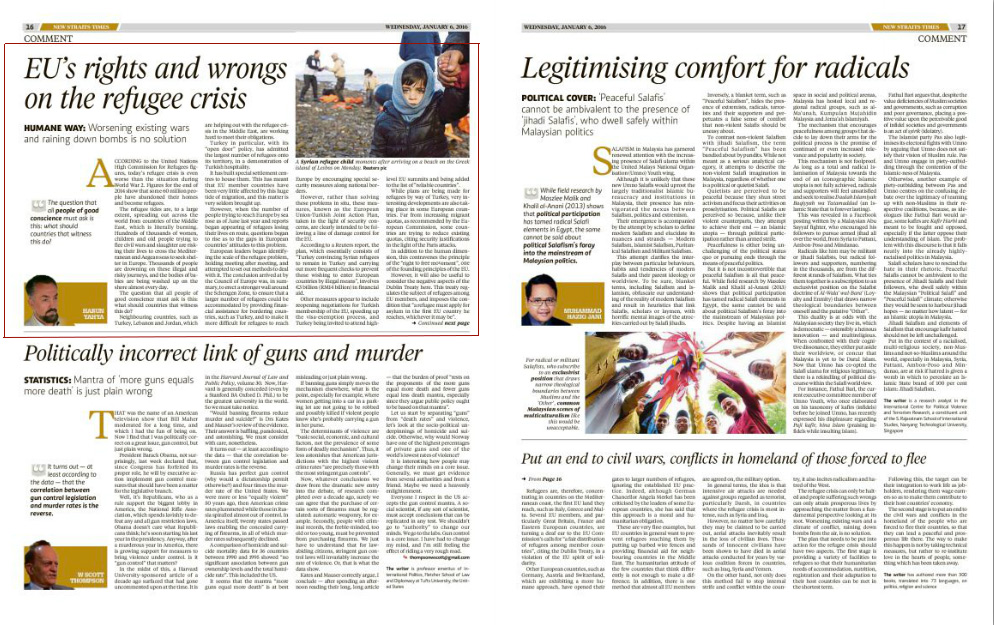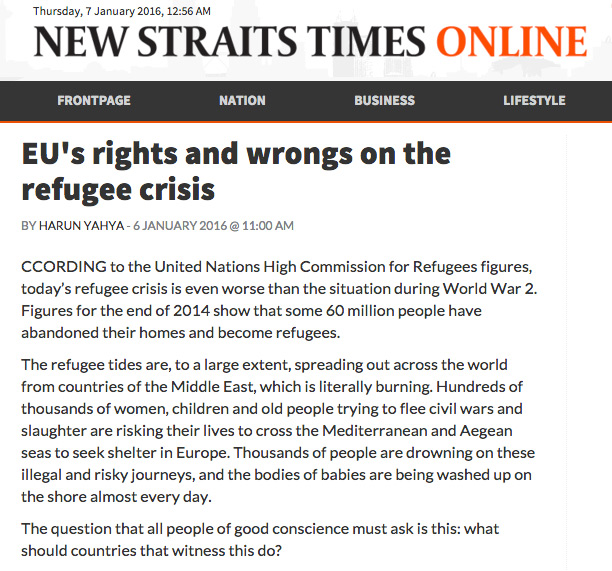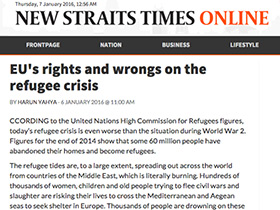
ACCORDING to the United Nations High Commission for Refugees figures, today’s refugee crisis is even worse than the situation during World War 2. Figures for the end of 2014 show that some 60 million people have abandoned their homes and become refugees.
The refugee tides are, to a large extent, spreading out across the world from countries of the Middle East, which is literally burning. Hundreds of thousands of women, children and old people trying to flee civil wars and slaughter are risking their lives to cross the Mediterranean and Aegean seas to seek shelter in Europe. Thousands of people are drowning on these illegal and risky journeys, and the bodies of babies are being washed up on the shore almost every day.
The question that all people of good conscience must ask is this: what should countries that witness this do?
Neighbouring countries, such as Turkey, Lebanon and Jordan, which are helping out with the refugee crisis in the Middle East, are working hard to meet their obligations.
Turkey in particular, with its “open door” policy, has admitted the largest number of refugees onto its territory, in a demonstration of Turkish hospitality.
It has built special settlement centres to house them. This has meant that EU member countries have been very little affected by this huge tide of migration, and this matter is very seldom brought up.
However, when the number of people trying to reach Europe by sea rose as of June last year and reports began appearing of refugees losing their lives en route, questions began to rise as to the gaps in European countries’ attitudes to this problem.
European leaders began identifying the scale of the refugee problem, holding meeting after meeting, and attempted to set out methods to deal with it. The conclusion arrived at by the Council of Europe was, in summary, to erect a stronger wall around the Schengen Zone, to ensure that a larger number of refugees could be accommodated by providing financial assistance for bordering countries, such as Turkey, and to make it more difficult for refugees to reach Europe by encouraging special security measures along national borders.
However, rather than solving these problems in situ, these measures, known as the European Union-Turkish Joint Action Plan, taken in the light of security concerns, are clearly intended to be following a line of damage control for the EU.
According to a Reuters report, the plan, which essentially consists of “Turkey convincing Syrian refugees to remain in Turkey and carrying out more frequent checks to prevent those wishing to enter European countries by illegal means”, involves €3 billion (RM14 billion) in financial aid.
Other measures appear to include reopening negotiations for Turkish membership of the EU, speeding up the visa-exemption process, and Turkey being invited to attend high-level EU summits and being added to the list of “reliable countries”.
While plans are being made for refugees by way of Turkey, very interesting developments are also taking place in some European countries. Far from increasing migrant quotas, as recommended by the European Commission, some countries are trying to reduce existing quotas, citing security justifications in the light of the Paris attacks.
In addition to the human dimension, this contravenes the principle of the “right to free movement”, one of the founding principles of the EU.
However, it will also be useful to consider the negative aspects of the Dublin Treaty here. This treaty regulates the subject of refugees among EU members, and imposes the condition that “a refugee must apply for asylum in the first EU country he reaches, whichever it may be”.
Refugees are, therefore, concentrating in countries on the Mediterranean coast, the first EU land they reach, such as Italy, Greece and Malta. Several EU members, and particularly Great Britain, France and Eastern European countries, are turning a deaf ear to the EU Commission’s calls for “a fair distribution of refugees among member countries”, citing the Dublin Treaty, in a violation of the EU spirit of solidarity.
Other European countries, such as Germany, Austria and Switzerland, which are exhibiting a more humane approach, have opened their gates to larger numbers of refugees, ignoring the established EU practice. Indeed, although German Chancellor Angela Merkel has been criticised by the leaders of some European countries, she has said that this approach is a moral and humanitarian obligation.
These are very fine examples, but EU countries in general want to prevent refugees reaching them by putting up barbed wire fences and providing financial aid for neighbouring countries in the Middle East. The humanitarian attitude of the few countries that think differently is not enough to make a difference. In addition, there is one method that almost all EU members are agreed on, the military option.
In general terms, the idea is that intensive air attacks are needed against groups regarded as terrorist, particularly Daesh, in countries where the refugee crisis is most intense, such as Syria and Iraq.
However, no matter how carefully they may be claimed to be carried out, aerial attacks inevitably result in the loss of civilian lives. Thousands of innocent civilians have been shown to have died in aerial attacks conducted for years by various coalition forces in countries, such as Iraq, Syria and Yemen.
On the other hand, not only does this method fail to stop internal strife and conflict within the country, it also incites radicalism and hatred of the West.
The refugee crisis can only be halted and people suffering such wrongs can only attain prosperous lives by approaching the matter from a fundamental perspective looking at its root. Worsening existing wars and a climate of conflict, raining down bombs from the air, is no solution.
The plan that needs to be put into action for the refugee crisis should have two aspects. The first stage is providing a variety of facilities to refugees so that their humanitarian needs of accommodation, nutrition, registration and their adaptation to their host countries can be met in the shortest term.
Following this, the target can be their integration to work life as jobholders, rendering them wage earners so as to make them contribute to their host countries’ economy.
The second stage is to put an end to the civil wars and conflicts in the homeland of the people who are forced to flee their countries, so that they can lead a peaceful and prosperous life there. The way to make this happen is not by taking technical measures, but rather to re-institute love in the hearts of people, something which has been taken away.
Adnan Oktar's piece in New Straits Times:



